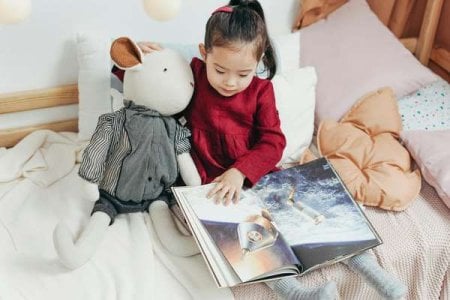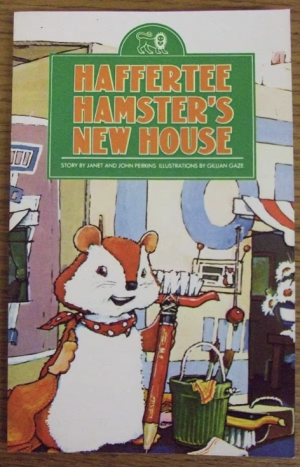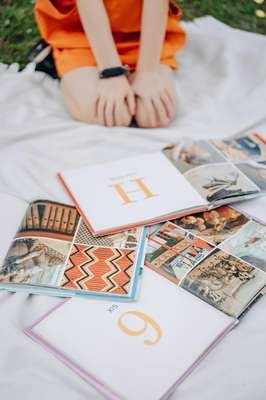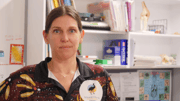Friday essay: ‘The magnitude of their love was extraordinary’–How an elderly couple showed Alice Pung the power of a good story
- Replies 0
Every year on our birthdays, Uncle Martin and Auntie Stella would drive to our concrete house behind the carpet factory and gift me and my brother a book. They brought me Haffertee Hamster and Haffertee’s First Easter. They brought Alex Betsy Glowworm Shines Her Light and Friska, My Friend. There was a biography of the African American surgeon Ben Carson. My first Children’s Illustrated Dictionary.
Even when our parents forgot our birthdays, this elderly couple always remembered.
When my parents first arrived in Australia, they thought the government had put them in a five-star hotel. The Midway Migrant Hostel was just a group of sturdy brick buildings that looked like brown slab cakes – but compared to the cardboard and plastic tents in the camp at the Thai–Cambodian border where they’d been staying only a month before, these buildings were evidence of a life after death: the death of half of our family in the Killing Fields.
In this glorious afterlife, the residents of the Midway Migrant Hostel even had visitors, souls so pure and kind that they could only be sent from God. And indeed they were.
Uncle Martin and Auntie Stella visited the hostel with food for the adults, toys for the children, and they brought secondhand furniture for the families who’d moved into their own houses. They invited us to their church, but their love was not conditional on conversion. They called themselves our godparents, and neither they nor my family thought anything unusual about this arrangement.

The Midway Migrant Hostel looked like ‘a five-star hotel’ to Alice Pung’s parents when they arrived in Australia. Image source: National Archives of Australia.
Godparents in wonderland
Uncle Martin and Auntie Stella were in their 70s and had four grownup children. When I was born less than a month after my parents arrived in Australia, they came to visit us at the hospital and marvel at the first Chinese baby they’d ever seen, with a mop of black hair. My father proudly told them that he’d named me Alice because he thought Australia was a wonderland and he was happy that I’d grow up in such a paradise.Auntie Stella wrote my birthday in her little floral pocket notebook, and every single year of my life until I became an adult, she delivered me a present without fail. They visited us at home and never judged the mess in our house or commented on my grandmother’s Buddhist shrine.
Also read: Harvard Love Expert Says This Surprising Habit—Not Passion—Predicts If Your Relationship Will Last Forever
We secretly wanted to believe that we were their special favoured family, but we guessed that Uncle Martin and Auntie Stella were doing this for other refugee families as well. I knew that other children’s names and dates of birth would be in Auntie Stella’s little book and that every year she and Uncle Martin would bring them all a gift on their birthdays, too. We did not mind this. The magnitude of their love was extraordinary, and in such abundance that there could be no cause for envy.
The books were simple, earnest, and good. Haffertee was a toy hamster Ma Diamond made for her daughter Yolanda when Yolanda’s real hamster died. It was named Haffertee because Yolanda thought her hamster was a girl and wanted to bring her home to 'have her tea'. Haffertee, an inanimate toy that comes to life through sheer love, showed us the power of imaginative empathy. The families in those books also had imaginative empathy as the adults had reasoned discussions and talked to children as if their thoughts mattered.
Love imbued with anxiety
In our world, adults were often angry giants. They loved us but they also yelled at us and controlled everything, from when and what we ate, to what we were allowed to have and wear, and who we were allowed to see at any given time. Those who have the least often have the most inadequate physical buffers against the world: the chemicals of the factories were closer to our lungs, the vehicles we drove were made of thinner metal, the clothes we wore were made of poor-quality fibres and textures.Our parents loved us, but their love was imbued with anxiety, the real fear that bad things had happened and could happen again, things beyond mortal control. They talked a lot about who was 'smashed', who was starved, who was lost. They’d talk this way at any time – over dinner, crossing the road, looking at tins of food in the supermarket, even when they were content and shelling peanuts on the front veranda of our first house.
Also read: Gen Z’s pink dashboard trend has experts worried—is their love of ‘aesthetic’ putting lives at risk?
Uncle Martin and Auntie Stella were different. They talked to us as children, even when we failed to maintain eye contact, even when we hid behind sofas and doors, too shy and ashamed and guilty over our inability to express true gratitude. But my brother and I read the books over and over again until we could memorise lines and copy the illustrations. I even tried to sew myself a Haffertee hamster.
My parents forgot school interviews and concerts, not from indifference, but from the foggy-mindedness induced by the sort of invisible and exploitative work that delivered comforts to wealthier households. So, as children, we didn’t know how to be likeable, no one had ever taught us. We’d only been taught how to make ourselves useful.
The books Auntie Stella and Uncle Martin gave us were all about being useful, but they also contained things that had never crossed our minds before: that work was to be appreciated, not just expected, and that it was possible to find contentment in life through living it with great care, consideration, and purpose, not just in pursuit of a short 'happily-ever-after' paragraph at the end.
These were simple books, not the perennial literary childhood classics, and many of them are now out of print. Most of them – aside from the Children’s Illustrated Dictionary – imparted some kind of lesson. Betsy Glowworm, for instance, lit up the cave so Billy Badger could see his food, while the naughtier Beryl Glowworm kept them all stumbling in the dark.
Suffused with love and reason
Auntie Stella and Uncle Martin gave me a beacon of light, the gift of reading. There was no library near our house when I was growing up, but our suburb had a tool library for men with anger issues.Besides the free government guides on Dangerous Snakes and Spiders and the hospital’s Bringing Home Your Baby book, for a while these gifts were the only other English books we owned. I got to go places in my childhood because of these books – places that were safe and warm and suffused with love and reason.
I made little handmade books for Uncle Martin and Auntie Stella at Christmas. Uncle Martin always told me in great earnestness, 'You learned English so well, we are amazed by how well you speak and read, and how wonderfully you write.' To more sophisticated minds, these words might be misconstrued as patronising. To me, they were earnest encouragement.
Over the years, there were of course presents that weren’t books: a set of two beautiful knitted dolls, an embroidery set, chocolates and Easter eggs. But these things are long gone, or passed on to younger cousins. What remain are the books.
When Uncle Martin passed away many years after his beloved Stella, their daughter Ruth sent me a message. She’d found her late mother’s diary when cleaning the house. In an entry from January 4 2000, Auntie Stella had written: 'We went to buy birthday presents specially book for Alice Pung.'
The power of a good story
When I go to children’s bookstores with my own children, I see they are filled with big bright titles like Kindness, In My Heart: a book of feelings, and I Am Peace. But I believe children are born with the full spectrum of human feelings. They don’t need to be told how to love or be kind or generous. They also don’t need to be taught how to feel the pettier emotions: annoyance, resentment, jealousy, misery. What they probably need now, more than ever, is the power of a good story, larger than their egos or even capacity for feeling.I still have all of Auntie Stella and Uncle Martin’s book gifts. This is the legacy they left us, and I will pass these books on to my children. In Betsy Glowworm, they may learn that just because you are having a bad day, you don’t dim your light. You do not block out the light of others.
Sometimes, you just have to do what has to be done, even when you don’t feel like it. I learned this lesson from watching the adults around me. They did not want to work in low-skilled jobs when they might have been nurses or engineers back home, but they did. They did not want to be polite to the racist store assistant who would never address them directly, just speak to their children, but they were. And they did not want to take anything or anyone for granted.
Every year at Christmas, we’d visit Uncle Martin and Auntie Stella. We children would sit on the floor and bask in the light of our Australian godparents – and we could see, even in the faces of the adults, that they felt truly seen – not for who they were, but for what they still might become.
In that diary entry of Auntie Stella’s, she’d written at the very top a passage from her favourite book: 'Let everything I do reflect my love for you.'
We were blessed by this love, but through the books they gave us, the gifts of reading, we were also given the gift of hope.
Read next: Men secretly test dates with new tests to expose their true intentions
This is an extract from The Gifts of Reading for the Next Generation, edited by Jennie Orchard and published by Scribe on July 1 2025.









